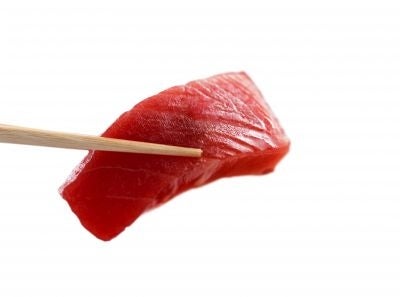Sushi wars: Battle looms over bluefin tuna

The fate of Atlantic bluefin tuna, eaten to the edge of viability, will be decided in the next two weeks when the world's nations vote on whether to ban cross-border trade in the dwindling species.
A proposal by Monaco, backed by the United States and the European Union, would place the open-water predator in Annex I of the 175-nation Convention on International Trade in Endangered Species of Wild Fauna and Flora (CITES), which meets in Doha, Qatar on March 13-25.
Any steps to remove the ban would depend on the species' capacity to regenerate, which experts say could take a decade or more.
Industrial-scale harvesting on the high-seas has caused bluefin stocks to crash by more than two-thirds in the Mediterranean and by 80 percent in the western Atlantic.
The reason is not hard to find: a single 220-kilo (485-pound) fish can fetch 160,000 dollars (120,000 euros) at auction in Japan, which consumes three-quarters of all the bluefin caught in the world, mainly as sushi and sashimi.
At those prices, the incentive to overfish - and cheat on poorly enforced quotas - is overwhelming, say experts.
The tools of the trade have developed apace. So-called longlines trailing 100 kilometres or more behind trawlers have proven devastatingly effective in vacuuming up bluefin, which can reach four metres (13 feet) in length.
The French marine research institute IFREMER, citing industry scientists, calculated that the capacity of tuna flotillas trolling the Mediterranean "surpasses the reproduction capacity of the resource" by a factor of two to three.
Three countries alone - France, Italy and Spain - account for more than 50 percent of catches.
Up until 2008, when the catch fell by half, annual hauls were 50,000 to 60,000 tonnes.
"If trade is stopped in Doha, all the scientists agree that bluefin tuna can recover," said Sue Lieberman, policy director for the Pew Environment Group in Washington.
"Another two-to-five years of overfishing, and they won't."
For the last 50 years, the management of bluefin populations has been self-policed by the International Commission for the Conservation of Atlantic Tunas, or ICAAT, an industry group.
"ICAAT has demonstrated on an annual basis its inability to listen to the scientists and control the fishing," said Carl Safina, founder of the Blue Ocean Institute in New York state.
As recently as the 1980s, bluefin were so numerous they were like "the buffalo herds in the virgin prairies of America," he said, recalling his own past as a professional fisherman.
"An international ban is essential if we ever want to see the species recover," he said.
Still, the measure to ban international commerce is headed for fierce resistance, and faces an uphill battle if it is to gather the two-thirds vote needed for passage.
"There's going to be a huge fight," said one senior European negotiator in favour of the ban, asking not to be named.
"Japan is extremely determined. We have seen them in action at the International Whaling Commission, where we have witnessed unexplainable reversals of position by certain countries," he said.
China and Canada are also likely to oppose the ban, analysts say.
For 2010, ICAAT has lowered the permissible global catch to 13,500 tonnes.
"If the new quota were to be respected for several years, there would be no more scientific justification for banning international trade in the fish," said Alain Fonteneau, a marine biologist at France's Institute for Development Research in Montpellier.
But critics say this may be too little too late, and that the industry has proven that it is unwilling or unable to enforce its own measures.
"ICAAT has been responsible for bluefin tuna since the 1960s, and every year it has continued to decline, in some places by 90 percent," said Lieberman.
Join our commenting forum
Join thought-provoking conversations, follow other Independent readers and see their replies
Comments
Bookmark popover
Removed from bookmarks